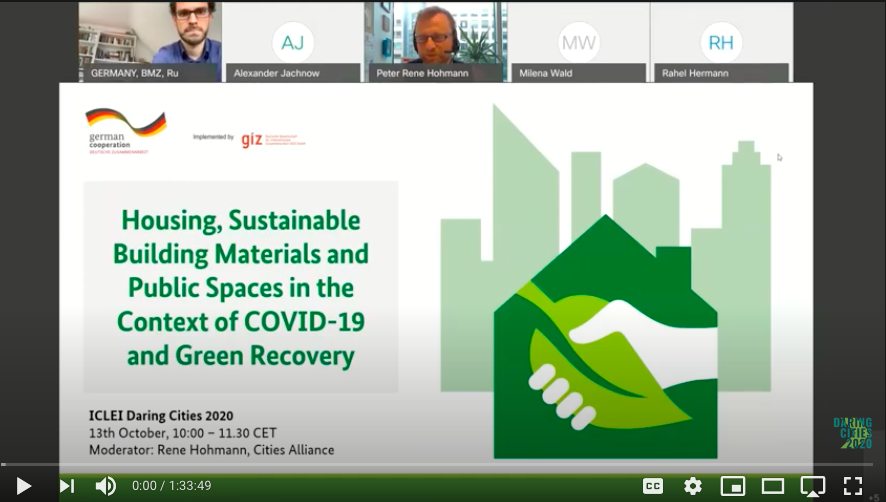
In order to access the video, you must create an account on Daringcities.org or log-in.
Rapid urbanisation, most of it to be expected in Africa and Asia, has been putting large pressure on cities, the housing and construction sector for decades. Adding to this challenge, the Covid 19 pandemic has made people living in informal areas even more vulnerable in terms of health and economic opportunities.
Today, almost 900 million people live in informal settlements without proper access to adequate shelter and basic services. By 2030, it is estimated that as many as 3 billion will not have access to secure and affordable housing. At the same time, buildings already contribute to 40 % of all energy-related greenhouse gas emissions and consume more than a third of the entire global energy. The use of conventional building materials such as 2 cement, steel and aluminum in cities is contributing to approx. 75% of the CO2 budget for the 1.5-degree climate goal.
Against the background of the Covid-19 pandemic and the concept of ‘social distancing’, which means a physical distance between people, one issue becomes very clear to urban residents: there is not enough ‘open public space’ in cities to provide a place where people can simply walk, meet each other and move around without taking risks. The new forms of competition to make more use of public streets, pedestrian paths or other public spaces lead to an urgency to rethink existing norms, rules and principles that require stronger public sector inventions and urban planning measures for liveable urban communities, not only for those who are able to spend money on commercial public space.
While housing is a basic human need for shelter, it also provides the base from which households participate in the economy. In most emerging markets, the construction sector contributes between 3-8 % of the GDP, a third of which originates from housing. Investment in quality, climate-smart housing opens up economic opportunities, improves health conditions, and contributes to the global climate agenda.
The key question for this session is how we can meet the immense future housing demand while making use of sustainable construction and providing quality open space, following a “Green Recovery” trajectory.
Key benefits:
- Facilitate an international dialogue on housing and public space with a focus on the future role of local and sustainable building materials for economic development within the green recovery context
- Connect an interdisciplinary mix of participants, introduce good practice examples and identify synergies for new collaborations among actors
Moderator:
- Rene Hohmann, Head of Global Programmes, Cities Alliance
Panelists:
- Ana Hernández Chamorro, Research associate at the Center for Energy Efficient and Sustainable Design and Building, Technical University of Munich, Germany
- Lucy Livesley, Director of Market Transformation, REALL, Coventry, UK
- Clara-Luisa Weichelt, Advisor Urban Development, MISEREOR e.V., Aachen, Germany
- Alexander Jachnow, Head of Urban Strategies and Planning, Institute for Housing and Urban Development Studies (IHS) at Erasmus University Rotterdam, The Netherlands
